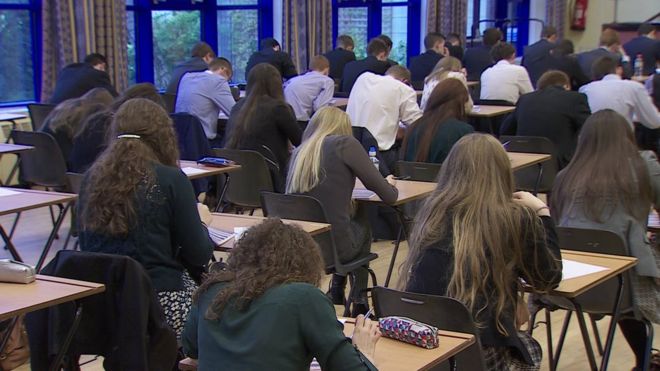
- A cancelled government education scheme helped thousands of pupils improve their English and maths results.
- The literacy and numeracy signature programme ran from 2013 to 2015 but was not renewed due to a lack of money.
- It helped almost 19,000 pupils, provided jobs for 310 new teachers and gave extra staff to hundreds of schools.
- The final report on the second year of the programme has just been published by the Department of Education (DE).
- Funding
- It received £13.8m funding from the Office of the First and Deputy First Minister (OFMDFM) and an additional £1.9m from DE.
- The scheme was targeted at pupils in both primary schools and post-primary schools who were struggling to reach basic standards in English and maths.
- Only newly-qualified teachers could apply for the jobs, which were for a two-year period.
- The final report reveals that of pupils helped by the scheme:
- 76% of primary school pupils reached level four or above in English, the expected skill level at the end of primary school;
- 80% of primary school pupils reached level four or above in maths;
- 65% of post-primary pupils got a GCSE grade C or above in English;
- 60% of post-primary pupils got a GCSE grade C or above in maths.
- Implications
- A majority of pupils supported by the programme also improved their attendance at school.
- Almost nine out of 10 primary schools that took part said the signature programme was successful.
- Eight out of 10 post-primary schools also reported that it had benefited pupils.
- Chris Donnelly, the principal of Holy Cross Boys’ Primary School in Belfast, said the programme had a proven impact on his pupils, with teachers working with them in small, tutorial-style groups.
- “One of the keys to the success of [the scheme was that] it wasn’t necessarily targeting the children who would be deemed the low attainers, like so many of the initiatives in schools do,” Mr Donnelly said.
- Aims
- “It was targeting children who were underachieving – that’s a distinct cohort of children, and we were able to see the success.
- “Schools are going to now feel the pinch, and unfortunately initiatives like this and their legacies that are going to suffer.”
- The final report said the signature programme had “far-reaching implications”.
- “Not only were the original aims achieved but the programme produced a number of outcomes and made a positive impact in our schools,” it said.
- It was revealed that the signature project was ending in June 2015, although some school principals had called for it to be extended.
- [Source:- BBC]
‘positive
Update: TSX Little Changed Monday, Kept Positive by Tech & Financial Shares

Canada’s main stock market posted a slight gain Monday with trading rather quiet to start the week and nothing on the domestic calendar to provide a spark. The S&P/TSX Composite Index added 5 points to close at 16,004.
Tech stocks gained around 1%, telecom stocks were up 0.6% and financials gained 0.2%, paced by the big banks. On the negative side, energy lost 1.7% on weakeroil prices while materials shed 0.7% as gold stocks fell.
In stock news, heavily traded Aurora Cannabis (ACB.TO) climbed 5% after confirming it would proceed with a takeover bid for CanniMed Therapeutics (CMED.TO) after receiving no response from the company’s board last week. CMED shares gained nearly 2% after Aurora said it would take its $24 per share bid directly to shareholders. TransCanada Pipeline (TRP.TO) gained 1.5% after Nebraska’s Public Service Commission today approved the Keystone pipeline’s passage in a 3-2 vote, although not along the preferred route for the $10 billion project. Enbridge (ENB.TO), one of the day’s most influential shares, gained 2.4%.
There were no economic reports in Canada today. September wholesale trade data is due Tuesday morning.
The Canadian dollar lost about a quarter of a cent to 78.09 US.
source;-nasadaq


